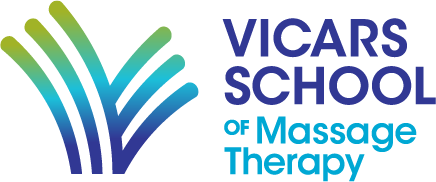At MH Vicars School, we often say that a massage therapy career can be whatever you want it to be. Carly Turner and Gwen Evans are a great example of this. Carly and Gwen were classmates at Vicars, and graduated in 2018. They now work together at Theralleve Therapeutic Massage and Wellness Clinic in Calgary, which Carly owns. Both Carly and Gwen offer a wide range of therapeutic massage treatments, but what really makes their clinic stand out is how clearly the two of them have been able to develop and communicate their professional philosophies. They both have a very clear idea of what kind of massage therapists they want to be. This important because it not only motivates them, but helps them find clients who share the same goals.
Our Edmonton Director Robin Collum recently had the opportunity to talk with Carly and Gwen, and they were having such a good time that they couldn’t bear to cut it short! So we’ve broken the conversation into two parts.
In Part 1, the three of us talked about the approach they take to practicing massage therapy. Watch the video of our conversation, or read it below.
Robin
Carly, I’ll start with you. Can you tell us a little bit about your treatment philosophy?
Carly
Well, I think that for so long, there’s been a reputation around massage that it’s is strictly to help somebody feel good for an hour. That it’s just going to feel really relaxed, you’re not really going to get into anything major. You know, that the client is there just to calm down and sleep. But it’s so much more! If people come in and they have an injury, or if they have some sort of pain, we really want to get to the core of that pain. This is where our training in orthopedic testing can come in, and the overall assessment.
I’m very big on asking very specific questions. And although I definitely have some intuitive spots to my massage, I’m definitely very, very technical in my approach. And that really informs the questions that I’m going to ask, how I’m going to treat the muscle group. I say, “OK, how can we educate the client?”
I want to help them know more about what their pain is, and then be able to empower them further by giving them home care, by giving them the ability to really connect the dots so that it isn’t so passive.
We want to make things more two-sided. It’s not the therapist saying “I know all.” At the end of the day, you know your body as a client. And if I can help you understand it better by what I’m also noticing, then we create that better relationship for your health going forward.
Robin
Same question for you, Gwen. Can you tell me a little bit about your approach to massage therapy, and what kind of practice you’re trying to build?
Gwen
It’s actually very, very close to how Carly approaches it. We were classmates in first year, so we got a lot of that together. But there is there’s a couple of things where my approach is a little bit different. Whereas Carly is definitely very much about education—and I am too—I’m also very much about mindfulness of the stuff that people deal with mentally.
And obviously we stay within our scope of practice. But I have a lot of clients who deal with anxiety and body or gender dysmorphia and things like that. So my focus to that is ensuring that they constantly feel safe and that they can trust me to give them an effective treatment based on how they’re experiencing things, because not everybody experiences things the same way.
I work a lot with the LGBTQ+ community, and I also work a lot with clients who have a history of trauma as well as just increased generalized or social anxiety. And I live with a lot of that stuff personally. So for me, it’s really easy to translate that into massage—without exceeding my scope, obviously.
So for example, a client with trauma might have issues with having their neck worked on. So it’s a simple question of knowing to ask “Are you comfortable with this?”
With the LGBTQ community, body and gender dysphoria are huge things. So body neutrality is kind of the approach that I take with that. With generalized anxiety, it’s a lot more checking in. And the biggest thing that connects all of that is something that we learned in school—thank you, Courtney! —was explicit consent.
I’m really big on consent. Even with Carly, if we do a treatment for each other, if I’m working on the glutes or other sensitive areas, I get her consent every single time without fail.
It’s very important to me to get it every single time, regardless of who I’m working with.
So this has helped me find a niche in the industry. Because I get a lot of people who have had—for lack of a better term—insensitive therapists. It’s simply just not knowing, more than anything. But taking that extra second to ask that important question of “Can I work on your neck?” or “Is there anything I need to be mindful of?” can make a huge impact for somebody with anxiety or touch related trauma issues.
Come back next week for Part 2!





